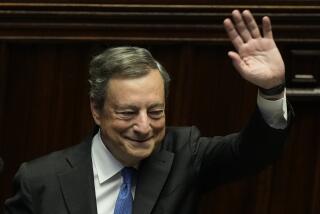Coup Rumors Swirl After Lower House Votes to Oust Yugoslav Prime Minister
VIENNA — Serbian nationalists in the Yugoslav Parliament voted late Monday to oust Prime Minister Milan Panic, prompting a crisis session of the federal leadership and another bout of rumors that the war-ravaged country was in the throes of a coup.
The Belgrade-based Tanjug news agency said an emergency session of the State Council, a supreme body that coordinates the powers of the government and armed forces, was convened by Yugoslav President Dobrica Cosic after the lower house of the federal Parliament launched a vitriolic attack on Panic.
After airing accusations that he was a spy and a traitor, deputies to the House of Citizens declared “no confidence” in Panic by a 93-24 vote, a move that will dismiss him if endorsed by the upper house.
The fate of the California millionaire-turned-statesman rested with the 60-member House of Republics, which was to meet in Belgrade this afternoon to vote on the issue.
The upper house is evenly split between Serbian deputies loyal to nationalist Serbian President Slobodan Milosevic and Montenegrins who have previously supported Panic in his quest to rescue Yugoslavia from isolation and ruin.
But Milosevic was reported to be strong-arming former allies from Montenegro to cross back into his nationalist camp. If he succeeds in collecting majority support for the motion against Panic, that would spell the end of the prime minister’s brief tenure and the new Yugoslavia’s last ties with the outside world.
A federation now consisting only of Serbia and Montenegro, following the secession of four other republics, Yugoslavia has been slapped with severe U.N. sanctions for helping Serbian rebels wage war against Croatia and Bosnia-Herzegovina.
Only a week ago, Panic and Cosic announced that federal and republic elections would be held Dec. 20 in hopes of unseating the nationalists who now dominate. Panic said he would not run for any parliamentary seat. But if ousted as prime minister, he might head an opposition coalition to present a unified moderate alternative to Milosevic’s destructive brand of nationalism.
Panic, 62, a naturalized U.S. citizen, left his California pharmaceuticals empire in July to become prime minister and to attempt a long-shot rescue of his economically shattered and ostracized homeland. He quickly developed a reputation for making brash promises and gestures, winning the support of millions who had grown weary of the fighting and clung to slim hopes of recovering the prosperity they once enjoyed.
In a four-month whirlwind of news conferences and aggressive diplomacy, he won some respect in international circles for trying to break the spell of nationalism cast by Milosevic and Cosic.
But because he was unfamiliar with the pitfalls of a fierce state propaganda machine that lured many ordinary Serbs to the nationalists’ side, Panic’s moves toward reconciliation with the West and tamping down rekindled ethnic conflicts often played into the hands of Milosevic and his radical allies.
During Monday’s parliamentary debate, Panic was denounced as a spy for the U.S. State Department and a traitor to the cause of Serbs throughout the Balkan states who are bent on uniting in a single country.
“All Serbs in one state” has been the rallying cry of Serbian guerrillas fighting in Croatia and Bosnia-Herzegovina. More than 24,000 people in the former Yugoslav federation are confirmed dead from the war that began in June, 1991; more than 2 million have been made homeless; nearly 60,000 are missing and presumed dead following imprisonment or “ethnic cleansing”--the chiefly Serbian practice of forcing non-Serbs out of territory they control.
Panic had angered the nationalists by proposing diplomatic recognition of Croatia and Bosnia-Herzegovina, which would officially relinquish Serbian claims on rebel-occupied land in those republics.
His recent visits to Kosovo province were also cast in a suspicious light by Belgrade TV, the bastion of Milosevic’s power. Footage of Panic embracing Ibrahim Rugova, Kosovo’s ethnic Albanian leader, was repeatedly broadcast after the prime minister’s Oct. 16 meetings in Pristina, subtly suggesting Panic was sympathetic to the Albanians who are a 90% majority there.
Serbs revere Kosovo as the cradle of their medieval kingdom and the scene of a glorious battle in 1389 in which masses of Serbs died in a vain attempt to halt the Turkish advance on Christian Europe. Milosevic has rallied masses of supporters with vows never to allow Kosovo to be ruled by non-Serbs.
Times special correspondent Laura Silber in Geneva contributed to this report.
More to Read
Sign up for Essential California
The most important California stories and recommendations in your inbox every morning.
You may occasionally receive promotional content from the Los Angeles Times.











